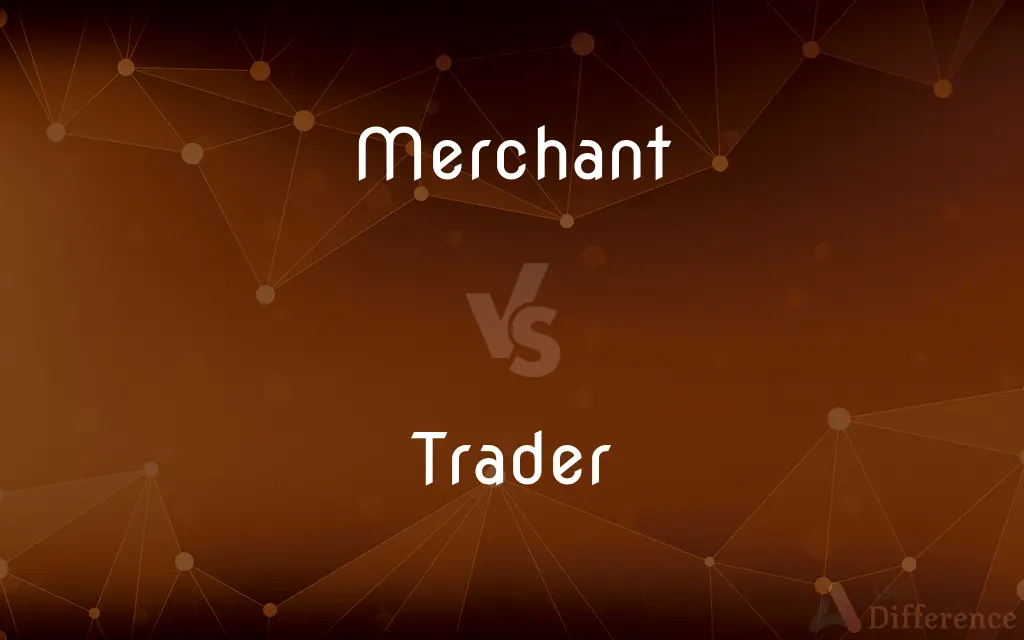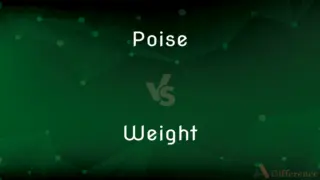Merchant vs. Trader — What's the Difference?
Edited by Tayyaba Rehman — By Fiza Rafique — Updated on October 31, 2023
A Merchant typically sells goods in retail or wholesale, often owning a shop or online store. A Trader buys and sells goods, commodities, or securities, often without a fixed retail space. Both operate in commerce, but their focus and scale can differ.

Difference Between Merchant and Trader
Table of Contents
ADVERTISEMENT
Key Differences
A Merchant and a Trader are both integral to the world of business, but their roles can differ substantially. A Merchant is often someone who deals directly with consumers, selling products in a retail or wholesale format, often having a brick-and-mortar or online presence.
In contrast, a Trader is more fluid in their dealings, focusing on the buying and selling of goods, commodities, or securities. While a Merchant might have a dedicated shop or online platform, a Trader often operates without such fixed retail spaces, focusing more on the trade dynamics.
The nature of the goods also differentiates a Merchant and a Trader. A Merchant's inventory might consist of varied products tailored for consumers, while a Trader could be specialized in specific commodities or securities, operating in exchanges or markets.
While both Merchant and Trader participate in the act of selling, their scale, and the scope can differ. A Merchant usually has a more stable and prolonged interaction with goods, possibly involving warehousing, displaying, and marketing them. On the other hand, a Trader might operate on quick turnovers, seeking profit from market fluctuations.
In essence, both Merchant and Trader play pivotal roles in the commercial landscape. The Merchant ensures products reach consumers, and the Trader ensures fluidity in the market, making goods and commodities available as required.
ADVERTISEMENT
Comparison Chart
Primary Focus
Selling goods to consumers
Buying and selling goods, commodities, securities
Establishment
Often has a physical or online store
Operates without fixed retail spaces
Nature of Goods
Varied products for consumers
Specialized commodities or securities
Duration of Interaction
Stable, long-term inventory management
Quick turnovers, market fluctuations
Customer Interaction
Direct interaction with consumers
Less direct, often deals in bulk or markets
Compare with Definitions
Merchant
Someone who deals in a specific commodity.
He became a well-known wine Merchant.
Trader
An individual dealing in a specific commodity or product.
She is a renowned spice Trader.
Merchant
A businessperson who promotes or exchanges goods.
The Merchant traveled abroad to find exotic items.
Trader
A person who buys and sells goods, commodities, or securities.
The Trader studied the stock market diligently.
Merchant
An owner or operator of a retail establishment.
The local Merchant always greeted customers with a smile.
Trader
Someone who engages in trade, especially in financial markets.
He became a successful Trader on Wall Street.
Merchant
A trader, especially one in the past with large operations.
Merchants of the 18th century often owned large fleets.
Trader
One that trades; a dealer
A gold trader.
A trader in bonds.
Merchant
A merchant is a person who trades in commodities produced by other people, especially one who trades with foreign countries. Historically, a merchant is anyone who is involved in business or trade.
Trader
(Nautical) A ship employed in foreign trade.
Merchant
A person or company involved in wholesale trade, especially one dealing with foreign countries or supplying goods to a particular trade
A builders' merchant
A tea merchant
Trader
One who earns a living by trading goods or securities.
Merchant
A person who has a liking for a particular activity
His driver was no speed merchant
Trader
One engaged in trade or commerce; one who makes a business of buying and selling or of barter; a merchant; a trafficker; as, a trader to the East Indies; a country trader.
Merchant
(in historical contexts) relating to merchants or commerce
The growth of the merchant classes
Trader
A vessel engaged in the coasting or foreign trade.
Merchant
One whose occupation is the wholesale purchase and retail sale of goods for profit.
Trader
Someone who purchases and maintains an inventory of goods to be sold
Merchant
One who runs a retail business; a shopkeeper.
Trader
A businessperson focusing on trading rather than retailing.
As a Trader, he often secured bulk deals.
Merchant
Of or relating to merchants, merchandise, or commercial trade
A merchant guild.
Trader
One who seeks profit from market fluctuations.
The currency Trader benefited from the exchange rate differences.
Merchant
Of or relating to the merchant marine
Merchant ships.
Merchant
A person who traffics in commodities for profit.
Merchant
The owner or operator of a retail business.
Merchant
A trading vessel; a merchantman.
Merchant
Someone who is noted for a stated type of activity or behaviour.
He's some kind of speed merchant — he drives way too fast.
Goal merchant Smith scored twice again in the match against Mudchester Rovers.
Merchant
(obsolete) A supercargo.
Merchant
As a resident of a region, to buy goods from a non-resident and sell them to another non-resident.
A merchanting service
Merchant
One who traffics on a large scale, especially with foreign countries; a trafficker; a trader.
Others, like merchants, venture trade abroad.
Merchant
A trading vessel; a merchantman.
Merchant
One who keeps a store or shop for the sale of goods; a shopkeeper.
Merchant
Of, pertaining to, or employed in, trade or merchandise; as, the merchant service.
Merchant
To be a merchant; to trade.
Merchant
A businessperson engaged in retail trade
Merchant
A person or company involved in wholesale or retail trade.
The Merchant displayed the newest products in the front window.
Common Curiosities
Are Traders more prevalent in financial markets?
Many Traders operate in financial markets, but they also exist in commodities and other goods.
Can a Merchant operate online?
Yes, many Merchants have online stores or platforms.
Are Merchants primarily wholesalers or retailers?
Merchants can be either wholesalers or retailers.
Do both Merchants and Traders sell goods?
Yes, but while Merchants often retail, Traders focus on buying and selling, often in bulk.
Is a Trader more like a broker?
Traders can be brokers, especially in securities, but not all Traders act as brokers.
Do Merchants focus on specific commodities?
While some Merchants specialize, many offer a variety of products.
Do Traders need a physical store?
No, Traders often operate without fixed retail spaces.
Do Traders always profit from market fluctuations?
Many aim to, but market fluctuations can lead to profits or losses.
Are the risks the same for Merchants and Traders?
Both face risks, but they differ, with Traders often facing market volatility and Merchants managing inventory risks.
Is a Merchant's interaction with goods long-term?
Often, Merchants have prolonged interactions, managing inventory and sales.
Can a person be both a Merchant and a Trader?
Yes, depending on the scale and nature of their operations.
Is the term Merchant old-fashioned?
While historic, it's still widely used, especially in retail contexts.
Which profession requires more capital, Merchant or Trader?
Both can vary widely, but Traders in securities often deal with large capital.
Are online platforms making the term Merchant obsolete?
No, many online sellers still identify as Merchants.
Do all Traders work with physical goods?
No, many Traders deal with intangible securities or commodities.
Share Your Discovery

Previous Comparison
Youpon vs. Yaupon
Next Comparison
Poise vs. WeightAuthor Spotlight
Written by
Fiza RafiqueFiza Rafique is a skilled content writer at AskDifference.com, where she meticulously refines and enhances written pieces. Drawing from her vast editorial expertise, Fiza ensures clarity, accuracy, and precision in every article. Passionate about language, she continually seeks to elevate the quality of content for readers worldwide.
Edited by
Tayyaba RehmanTayyaba Rehman is a distinguished writer, currently serving as a primary contributor to askdifference.com. As a researcher in semantics and etymology, Tayyaba's passion for the complexity of languages and their distinctions has found a perfect home on the platform. Tayyaba delves into the intricacies of language, distinguishing between commonly confused words and phrases, thereby providing clarity for readers worldwide.















































